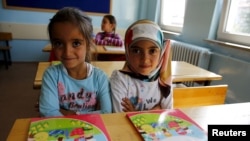The United Nations Children’s Fund is appealing for $2.8 billion to protect and assist some 43 million children around the world caught up in humanitarian emergencies, including conflict, epidemics and climate change.
This year’s appeal from UNICEF is slightly lower than last year’s, when the Ebola epidemic in West Africa required a sizeable chunk of the money designated for humanitarian emergencies around the world.
For the first time ever, UNICEF says the largest portion of the appeal — 25 percent — is going toward educating children in emergencies. The agency says it plans to provide education for more than 8 million children this year.
Five million of them will be Syrian children inside the country or living as refugees in countries nearby.
The UNICEF representative in Syria, Hanna Singer, knows the toll war takes on children. She called Syria the most dangerous place on Earth to be a child.
Many are killed and wounded from the fighting and many others die because medical care is lacking.
Singer, however, said the impact of the war on education, which she called a life-saving measure, is staggering. She said 2 million Syrian children are out of school. One in four schools can no longer be used.
And, she said the educational sector has lost 50,000 teachers because they were killed or forced to flee the country.
“For a country that before the conflict, education enrollment or school enrollment was over 90 percent, Syria has now lost two decades of educational progress," she said. "This is a real risk. There is a real risk that a whole generation of children will be lost.”
The funding in this UNICEF appeal will also assist children suffering from severe food shortages, violence, disease and abuse.
The U.N. agency says climate change is a growing threat, with hundreds of millions of children living in areas prone to heavy flooding or severe drought.
UNICEF’s director of emergency programs, Afshan Khan, told VOA children in Africa’s Sahel region are particularly vulnerable.
“There is a negative impact … on everyone, but primarily on children," said Khan. "It goes beyond the visuals of it. It is nutrition, it is safe water; it is very many other things that come with it. Livelihoods are affected, child poverty sets in, child labor comes in, exploitation, trafficking, movement of population.”
Other programs aim to assist children in politically volatile Burundi and countries around the Lake Chad region beset by conflict, food and water shortages.




